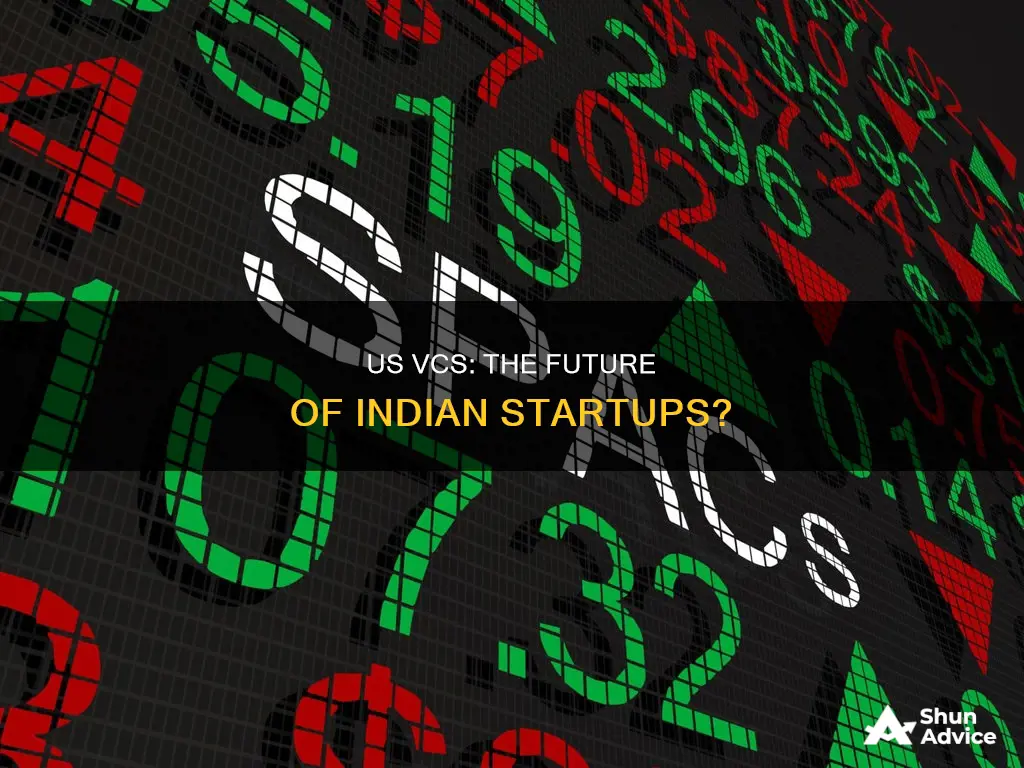
The United States is the third-largest investor in India, with FDI investments totalling $66.70 billion between April 2000 and June 2024. The country is also India's largest trading partner and the largest export destination, with bilateral trade exceeding $190 billion in 2023. The US and India have set an ambitious target of achieving bilateral trade worth $500 billion by 2025. The thriving startup ecosystem in India has attracted global investors, with the number of Indian startups skyrocketing in the last decade and an increasing number achieving 'unicorn' status. US venture capital firms have been instrumental in fostering this growth, with companies like Freshworks, WizRocket, and Shopalyst receiving funding from US-based investors.
| Characteristics | Values |
|---|---|
| US VC investment in Indian startups | Increasing |
| Reasons for investment | Thriving startup ecosystem, successful exits, growing confidence in India's startup ecosystem |
| US VC investment process for Indian startups | Similar to that of US-based companies, but with some differences e.g. investment through a Delaware corporation, longer timeframes due to Indian government regulations |
| Examples of US VCs investing in Indian startups | Accel Partners, Kalaari, Sequoia, Helion, Matrix, Accel India, Nexus Venture Partners, SAIF Partners, Chiratae Ventures |
What You'll Learn
- US VC investment in Indian startups is structured through a Delaware corporation
- Indian government regulations on foreign investment can delay the VC funding process
- VC funding is crucial for Indian startups in their early stages
- US-India Commercial Dialogue is set up to discuss trade and commerce relations
- US is the 3rd largest investor in India with FDI Investment of $66.70 billion from Apr 2000 to Jun 2024

US VC investment in Indian startups is structured through a Delaware corporation
US VC investment in Indian startups is often structured through a Delaware corporation. This is because investors prefer corporations over LLCs, as it is difficult to sell or transfer membership or ownership in an LLC, whereas it is relatively easy to trade shares in a corporation. Delaware C-Corps are also able to distribute stock options as incentives to employees, board members, and directors, which is a proven and inexpensive way of motivating staff.
Delaware C-Corps are also preferred over S-Corps, as all shareholders in an S-Corp must be US citizens, residents, and "natural persons", which a VC firm does not qualify as. Additionally, S-Corps can only offer common stock, whereas preferred stock is preferred by investors as it allows for more negotiation of shareholder rights. S-Corps are also limited to 100 shareholders, which may be an issue for investors.
Delaware C-Corps are the most popular entity choice for startup companies looking to attract investors, as they offer significant legal and tax benefits. There is no requirement for companies to have ties to Delaware in order to incorporate there, and Delaware is considered the world's premier forum for corporate law, with advanced corporate laws upheld by a dedicated business court. This predictability in judicial outcomes is referred to as the "Delaware Advantage".
Delaware's Court of Chancery has a long reputation for siding with the decisions of the Board of Directors over the financial whims of shareholders, and Delaware is regarded as the best legal forum for any business dispute. Delaware C-Corps also benefit from low taxes on retained earnings, and the ability to roll forward financial losses, accounting for some of its current losses in future periods to offset future gains.
Maximizing HSA Savings: Investment Strategies for Tax-Free Growth
You may want to see also

Indian government regulations on foreign investment can delay the VC funding process
India has government regulations on foreign investment, which can cause delays in the VC funding process for Indian startups. The country has sought to liberalise its economy and attract foreign investment, but there are still rules and procedures that must be followed when investing in Indian companies.
The Foreign Exchange Management Act 1999 (FEMA) and the regulations framed under it govern foreign investment in India. The Reserve Bank of India (RBI) and the Department for Promotion of Industry and Internal Trade (DPIIT) are the key authorities responsible for regulating and facilitating foreign investment. The DPIIT is the nodal department for formulating government policy on foreign direct investment (FDI) and maintains data on inward FDI.
There are two main routes for FDI in India: the automatic route and the government route. Under the automatic route, prior approval from the Government of India is not required, while under the government route, approval must be obtained from the relevant ministry or department before investing. The government route is mandatory for sectors not covered by the automatic route and those mentioned in sectoral policy. The RBI must be informed of investments under the automatic route within 30 days.
The FDI policy outlines sector-specific conditions and requirements that foreign investors must comply with. Some sectors, such as real estate, lottery, gambling, and betting, are prohibited from receiving foreign investment. In other sectors, there may be percentage thresholds for foreign investment or performance conditions that must be met.
The funding process for Indian startups seeking US VC investment may be delayed due to these government regulations. Indian companies receiving foreign investment must comply with reporting requirements and make necessary filings, such as Form FC-TRS and Form FC-GPR. Any delays in these filings can further slow down the process. Additionally, the formation of a private limited entity, which is common among India-based startups, can take between 60 and 180 days, causing additional delays.
Overall, the Indian government's regulations on foreign investment can impact the timing of VC funding for Indian startups. While the country has made significant efforts to liberalise and simplify the process, there are still rules and procedures that must be followed, which can result in delays.
The Key Traits of Successful Investment Managers
You may want to see also

VC funding is crucial for Indian startups in their early stages
Venture capital (VC) funding is crucial for Indian startups in their early stages for several reasons. Firstly, startups in the early stages often lack access to capital markets, and VC funding provides them with the necessary financial resources to grow and develop their businesses. This funding allows startups to transform their ideas into viable companies by providing the initial capital injection needed to develop prototypes, business models, and attract early customers.
Secondly, VC firms not only provide financial support but also offer strategic guidance, mentorship, and industry connections. They have extensive networks and deep industry expertise that can be invaluable to startups as they navigate the complexities of building and scaling their ventures. VC firms may also provide operational support and help startups with product development, market expansion, and team-building.
Additionally, VC funding can help Indian startups gain visibility and credibility in the market. By securing investments from reputable VC firms, startups can attract further investments from other investors, including angel investors and other VC firms. This can create a network effect, leading to more funding opportunities and increasing the chances of success for the startup.
Furthermore, VC firms can provide mentorship and advice to startup founders, who may be first-time entrepreneurs. This guidance can be crucial in the early stages of a company's life, helping them avoid common pitfalls and make strategic decisions that can impact their long-term success.
Moreover, VC funding can help Indian startups gain access to global markets and expand internationally. This is especially true for US-based VC firms investing in Indian startups, as they can provide valuable connections and resources to help Indian companies enter the US market and access a wider customer base.
Overall, VC funding plays a pivotal role in the success of Indian startups in their early stages, offering not just monetary investment but also strategic guidance, mentorship, and access to a strong network of industry experts and potential partners.
Investment Surpassing Savings: A Recipe for Economic Growth or Debt?
You may want to see also

US-India Commercial Dialogue is set up to discuss trade and commerce relations
The US-India Commercial Dialogue is a bilateral forum that was first established in 2009 as the US-India Strategic Dialogue. It has since served as a platform for the two countries to advance shared objectives in several areas, including regional security, economic cooperation, trade, and climate challenges. In 2015, recognising the shared priorities of generating economic growth, creating jobs, improving the investment climate, and strengthening the middle class in both countries, the forum was elevated to the US-India Strategic and Commercial Dialogue.
The inaugural US-India Strategic and Commercial Dialogue took place on September 21-22, 2015, in Washington, DC, and was hosted by the US State Department. Secretary of State John Kerry and Commerce Secretary Penny Pritzker were joined by their respective Indian co-chairs and other members of the delegations. The dialogue aimed to strengthen the partnership between the US and India to meet the challenges of the coming decades and deepen economic and commercial ties.
The US-India Commercial Dialogue specifically focuses on driving inclusive economic growth in both countries and across the region. The United States and India already have a significant trade relationship, with annual trade exceeding $150 billion. The dialogue seeks to further enhance this relationship by addressing various issues and identifying areas for closer collaboration.
One notable aspect of the dialogue is the inclusion of a CEO forum, which provides a platform for private sector partners to offer recommendations and identify areas for stronger trade and investment cooperation. This forum ensures that the discussions are informed by the perspectives of businesses operating in both markets.
The US-India Commercial Dialogue also highlights the joint efforts to tackle the climate crisis. The United States has shown support for India's clean energy commitments by investing in renewable energy projects and mobilising private sector financing. This collaboration aligns with the shared goal of addressing climate change and promoting sustainable development.
Wealth Managers: Where Do They Invest Your Money?
You may want to see also

US is the 3rd largest investor in India with FDI Investment of $66.70 billion from Apr 2000 to Jun 2024
The US is the third-largest source of foreign direct investment (FDI) in India, with investments totalling $66.7 billion between April 2000 and June 2024. The US is a significant contributor to India's economic growth, with FDI facilitating the transfer of technology, job creation, and various ancillary benefits.
The strong economic relationship between the two nations is reflected in their bilateral trade, which exceeded $190 billion in 2023, with India as the US's 9th largest trading partner and the US as India's largest trading partner. The US-India Comprehensive Global Strategic Partnership aims to further strengthen this relationship and promote mutual economic growth.
US venture capital (VC) investments in Indian startups follow a similar process to those in US-based companies, but with some differences due to India's government regulations on foreign investment. The investment process can be delayed due to the need for clearance checks and approvals from the finance ministry. Structuring the investment through a US entity, such as a Delaware corporation, is common to streamline future investments and for tax purposes.
The presence of a private limited entity in India, which typically houses the Indian employees and handles development work, adds complexity to the financing process. Ensuring intellectual property (IP) protection and navigating Indian laws and regulations can extend the timeframe for finalizing the investment. Overall, the US VC process for Indian startups involves similar documentation and due diligence as in the US but with additional considerations to navigate the Indian business landscape.
Saving and Investing: Your Guide to Financial Freedom
You may want to see also
Frequently asked questions
US VC investment in Indian startups can provide much-needed capital, strategic guidance, operational support, and access to a strong network of connections. It can also help Indian startups expand globally and access new markets.
Some notable examples of successful US VC investments in Indian startups include Freshworks (formerly FreshDesk), WizRocket, Shopalyst, Ola, Practo, Dailyhunt, and Flipkart. These companies have achieved significant growth and success with the support of US venture capital.
One of the main challenges of US VC investment in Indian startups is the regulatory hurdles and government regulations on foreign investment in India. The investment process can be delayed due to the need for clearance checks and approvals from the Indian government. Additionally, there may be cultural and geographical differences that need to be navigated.
Indian startups can improve their chances of attracting US VC investment by demonstrating high-growth potential, having a strong business model, and operating in sectors that are of interest to US VCs, such as deep tech, fintech, e-commerce, health tech, and agritech. Building relationships with US-based investors and seeking guidance from experienced professionals in the field can also help Indian startups navigate the VC landscape effectively.







